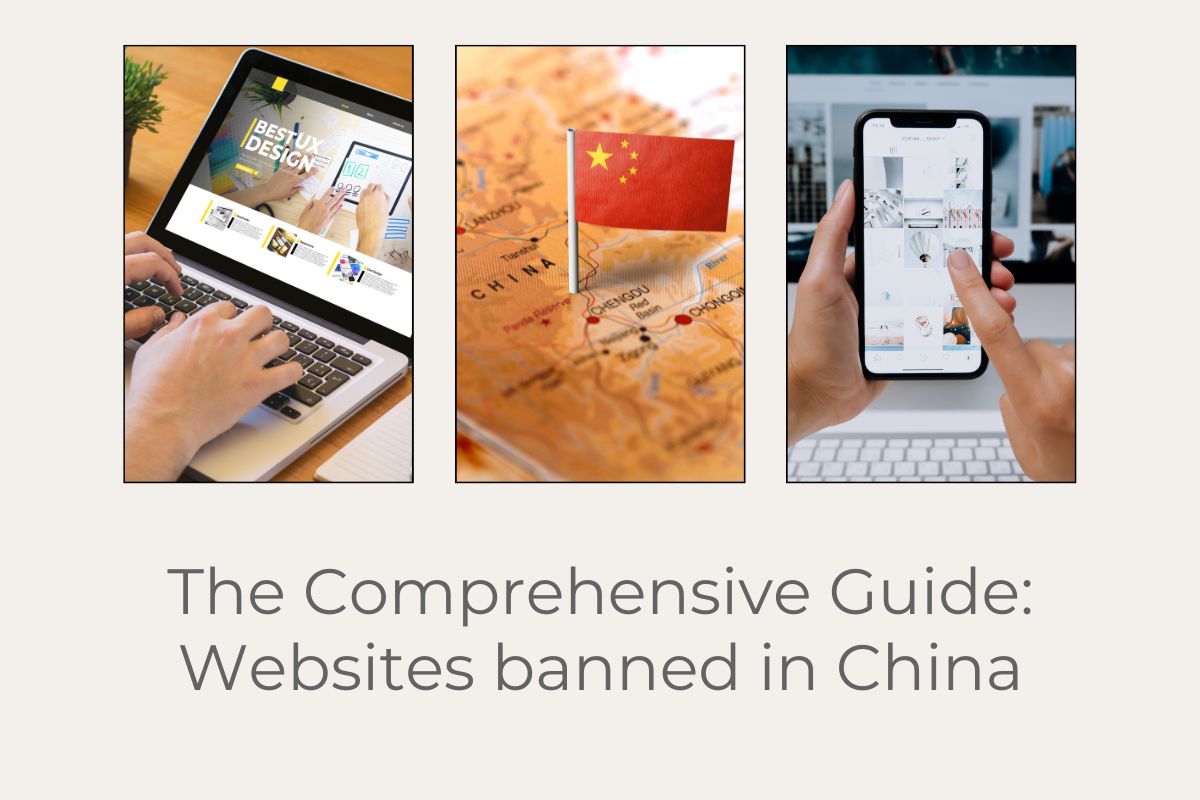The Comprehensive Guide: Websites banned in China
China’s approach to Internet governance is unique and complex, shaped by its political landscape, cultural values, and social objectives. The Great Firewall of China is a term often used to describe the country’s extensive internet censorship system that blocks access to specific foreign websites and monitors online activities.
In this guide, we’ll dive into the reasons why websites are banned in China, the list of websites banned, and how to access the Internet in China.

Table of Contents
I. Why Are Websites Banned in China
There are multiple reasons why websites are banned in China: including political, social, economic, and cultural factors. Knowing these motivations provides insights into the broader context of internet censorship in the country.
1. Political Control
One of the primary reasons for website bans in China is the government’s desire to maintain political control.
The Chinese Communist Party (CCP) has retained leadership of the country since 1949, maintaining a one-party socialist system and holding a firm over China’s political, economic, and social structure. By 2023, China will, in international terms, be officially considered a communist country, with the CCP limiting its citizens’s freedom of expression, and association, and keeping an iron grip on its political power.

Thus, the CCP is required to control the dissemination of any policy-related material that goes against its own beliefs. And for this reason, websites that support democracy, human rights, or independence movements, or that critique the CCP’s administration, are restricted or censored.
The websites below are blocked by the CCP due to discussing sensitive issues from China’s past:
- The Tiananmen Square protests: A string of pro-democracy demonstrations in Beijing during which a large number of demonstrators were killed or injured by the Chinese government, which labeled the demonstrations as a “counter-revolutionary riot.”
- Tibetan independence: The CCP views Tibet – an autonomous region in southwest China with a long history of seeking independence from Chinese rule – as an integral part of its territory. It moves to quickly censor any information about Tibet (and its exiled spiritual leader, the Dalai Lama) to quash discussions about its political status, human rights issues, and cultural suppression.
- Xinjiang: This autonomous region in northwest China is home to the Uighur ethnic minority – The CCP is oppressed through mass detentions, forced labor, and cultural suppression. The Chinese government denies any allegations of human rights violations, instead framing its actions within a narrative of counter-terrorism and deradicalization.
By now, the CCP still has control over all media, the internet, and public discourse within the country to maintain political stability and prevent the dissemination of views that contradict its own.
2. Social & Cultural Stability
To preserve social order, the CCP employs internet censorship, removing any content that could spark protests, strikes, demonstrations, or other types of public upheaval.
China, a nation with a wide range of ethnic groups, cultural identities, and linguistic traditions, also prohibits any information that supports separatist movements or calls for further autonomy in areas that are under its sovereignty (such as Xinjiang and Tibet). It seeks to foster ideas of a single, unstoppable China and a cohesive national identity. Furthermore, to uphold a certain degree of social conservatism, the Chinese government censors content that it considers to be incompatible with its traditional values. This includes content that is deemed to be morally or culturally objectionable. This covers any pornography.

3. Economic Considerations
Although political and social factors account for the majority of China’s censoring measures, there are also numerous economic justifications.
China defends and advances its own internet and technology enterprises by blocking apps and websites that are owned by foreign entities.
China features Tencent-owned WeChat instead of WhatsApp, Alibaba-owned DingTalk in place of Slack, and Baidu-owned Baidu Baike in place of Wikipedia. China’s government can promote job creation, economic growth, and greater tax income due to the dominance of domestic giants in the tech sector.
There is also the idea that the Chinese government can foster consumer trust and support the expansion of its digital economy by tightly regulating online materials and ensuring that its online markets run efficiently and without interruption.
II. List of Top Websites Banned in China
As a result of the aforementioned factors, many popular websites and services are inaccessible to users in China. Below is a detailed list of some of the most notable websites banned in the country.
1. Social Media Platforms
Social media platforms are among the most heavily censored websites in China. The government perceives these platforms as potential breeding grounds for dissent and unrest. Some of the most notable banned social media sites include:
- Facebook: Since 2009, Facebook has been blocked in China due to concerns over its role in facilitating protests and spreading information that challenges the government’s narrative. The platform’s ability to connect individuals across borders poses a significant threat to the CCP’s control over information.
- Twitter: Similar to Facebook, Twitter is banned in China for its potential to disseminate information rapidly and facilitate discussions that could undermine the government’s authority. The platform’s real-time nature makes it particularly challenging for the government to monitor and control content.
- Instagram: Instagram, a photo-sharing platform owned by Facebook, is also inaccessible in China. The government restricts visual content that could portray negative images of the country or promote lifestyles contrary to its values.

2. News Outlets
Independent news outlets that report on sensitive topics, criticize the government, or provide alternative viewpoints are often banned in China. Some prominent examples include:
- The New York Times: The New York Times has faced repeated censorship attempts in China due to its investigative reporting on issues such as corruption and human rights abuses. The site has been blocked since 2012.
- BBC News: The BBC has been a target of censorship due to its coverage of sensitive topics related to China, including the Hong Kong protests and the treatment of Uighurs in Xinjiang. Its website is routinely inaccessible within the country.
3. Search Engines
Search engines play a crucial role in how information is accessed and disseminated. In China, several major search engines are banned, including:
- Google: Google has been blocked in China since 2010 after the company refused to comply with government censorship demands. The ban includes all of Google’s services, such as Gmail and Google Maps, forcing users to rely on domestic alternatives.
- Bing: While Microsoft’s Bing search engine has faced intermittent accessibility issues, it is generally subject to strict censorship in China. Certain search queries may return limited results or be entirely blocked.
4. Video Sharing Platforms
Video-sharing platforms that allow users to upload and share content are also heavily monitored and often banned in China. Notable examples include:
- YouTube: YouTube has been inaccessible in China since 2009 due to its role in hosting videos that depict protests, government criticism, and other sensitive content. The platform’s user-generated nature makes it difficult for the government to control.
III. What Isn’t Banned in China
While many websites and services are banned in China, there are still numerous platforms that remain accessible. Understanding what is available can help users navigate the digital landscape more effectively.
- Netflix/Disney+ is still available in China. However, you can even access Netflix. You are not free to watch any content on them because China hasn’t licensed for this content.
- Facetime & iMessage are also accessible from China.
- As of 2023, no Western banks have had their websites or mobile banking apps blocked, and you should still be able to view and access your money when traveling to China.
- LinkedIn and Amazon aren’t blocked in China, but Amazon closed their operations there to focus instead on cross-border sales to Chinese consumers. eBay isn’t blocked in China, it simply fails to take root here.
The difficulties faced by eBay, LinkedIn, and Amazon in the Chinese market suggest that the reason Western companies don’t succeed there isn’t usually that they are blocked, but rather that they don’t have the same level of popularity and mainstream strength as their Chinese competitors.
IV. Top Connectivity Options in China
For travelers and expatriates in China, staying connected to the internet can be challenging due to the extensive censorship measures in place. However, there are several connectivity options available that can help users navigate the digital landscape more effectively.
| Top connectivity options | Pros | Cons | Price ranges |
| Using VPN | Easy to access any website even if you are in China. | It guarantees complete anonymity Slow down your internet speed May still log our data Are illegal in some countries Expensive costs (typically monthly/yearly) | $2-7/month (depending on providers) |
| Local SIM cards | Many local prepaid SIM cards available in China offer generous data packages at much lower costs than roaming. Offer good coverage, especially in major cities and tourist destinations. Maintain a consistent internet connection for navigation, social media, and other online activities. | Purchasing, and setting up a new SIM card can be a hassle, especially if you’re unfamiliar with the process or language barriers. If you’re only visiting China for a short period, the effort of obtaining a SIM card may not be worthwhile, and relying on Wi-Fi hotspots or renting a portable Wi-Fi device could be a better option. | $5-15/plan |
| Using eSIM | Easy to use, visitors just can scan the QR directly to their phone and don’t need a physical SIM card. Whether you’re staying for a few days or a whole month, eSIM offers data plans to suit your travel needs: 5, 7, 10 15, and 20 days for mainland China. | Make sure your phone is not unlocked, some types of phones may not work globally. Not all types of phones support eSIM. | $7-25/plan |
In summary, buying a local SIM card is the most cost-effective way to stay connected in China. However, in the digital era, using eSIM is more and more popular due to its advantages.
Read more Can China Tourist SIM cards/eSIM bypass Internet censorship in China?
V. How to Unlock Banned Websites in China
Unlocking banned websites in China requires a combination of tools and strategies. While VPNs are the most common solution, there are other methods that users can employ to regain access to restricted content.
- Choose a VPN: opting for a VPN that fits your budget & needs.
- Install your chosen VPN app on your device: It’s vital to do this before you get to China. The country blocks access to VPN websites, so don’t leave this too late. At this stage, you’ll also be prompted to create an account with some personal details.
- Choose a server: Once you’re in China and have access to the internet, you’ll be able to use your VPN to connect to a server from around the world.
- Get connected: After connecting to an international server, you’ll be able to access the internet with an IP address from that country – be that anywhere from Albania to China, and beyond.
VI. Final Words
Navigating the internet in China can be a daunting task due to the extensive censorship measures in place. Understanding the reasons behind the bans, the websites affected, and the tools available to bypass restrictions is essential for anyone seeking to access information freely. Whether you’re a traveler, an expatriate, or a resident, being informed about the digital landscape in China empowers you to make informed decisions about your online activities.



